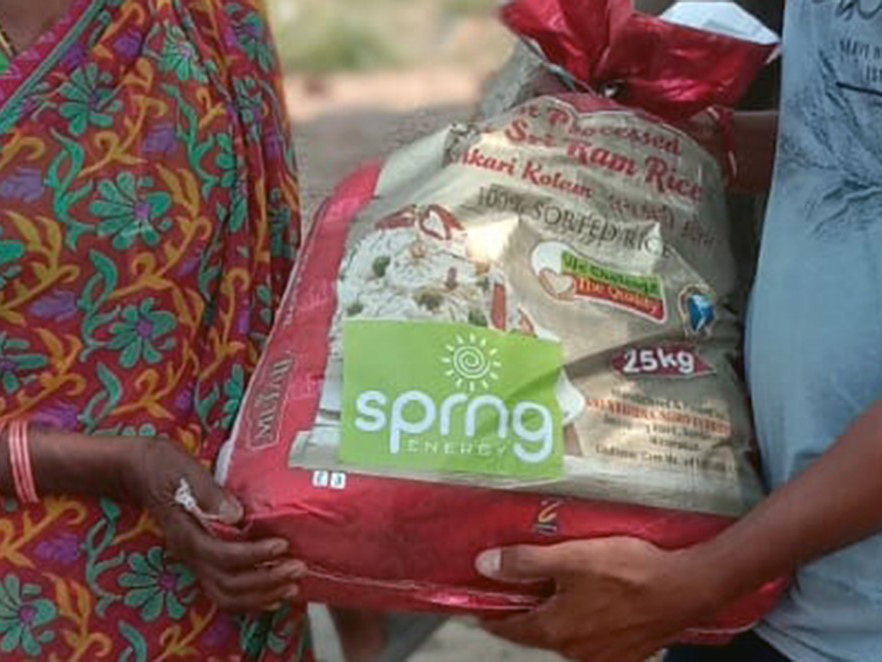
COVID-19 chronicles in India
With 1.3 billion people and a significantly under-funded and ill-equipped public healthcare system, the rapid spread of the virus could potentially have a catastrophic impact in India.
The Government has been acutely aware of the risks from an early stage of the crisis, and has put in place preventive measures starting as early as January 2020, when the first news reports of the COVID-19 spread emerged from China.
India was early into the fight against COVID-19. Initial containment in January focused on travel from COVID-19 impacted countries, with travel ban and mandatory quarantine alongside extensive airport screenings. As the number of COVID-19 patients in India kept increasing, parts of the country went into a semi -lockdown in mid-March, including complete suspension of incoming international commercial passenger aircrafts; some restrictions on domestic travel; closure of educational institutions, gyms, museums, and theatres; bans on mass gatherings; and work from home policies for non-critical businesses.
This was followed by a countrywide lockdown of three weeks starting March 25 (subsequently extended to 3 May), with all non-essential businesses and transport completely shut down, and people movement restricted to essential supplies and medical visits to doctors. For a country with an unorganised workforce of more than 400 million people, most of whom are daily wage earners, a complete lockdown was a difficult, but ultimately necessary step.
In tandem, the Government announced a series of fiscal and monetary measures to support the economy and its citizens, especially the most vulnerable low-income households. The Government announced a fiscal stimulus package in March (worth 0.8% of GDP), which entails direct benefit transfers (cash, food and cooking gas) to lower income households and insurance coverage for healthcare workers.
Cash transfers have been facilitated through direct transfer into bank accounts of beneficiaries seeded with Aadhar (national biometric identification), although in cases where such bank accounts were inactive, beneficiaries have had to depend upon non-Governmental agencies for subsistence.
The fiscal package was in addition to a commitment of US$2 billion to upgrade the health infrastructure for COVID-19 including testing kits, personal protective equipment, ICU beds and ventilators. Monetary measures include a reduction in borrowing rates by 75-90bps and an injection of liquidity into the banking system through various means such as reduction of Cash Reserve Ratio (CRR) and providing direct liquidity to banks under long term repo operations.
The Central Bank of India also recommended that al lenders offer their customers a moratorium of 3 months, on monthly instalments, on all outstanding loans. In addition, the Central Bank has provided regulatory forbearance on asset classification of loans to MSMEs and real estate developers
Five weeks into the lockdown, there is partial success in slowing the spread of COVID-19 notwithstanding possible under reporting due to a slow ramp up of testing. However, the impact on the country has been profound, both in terms of dislocation in people’s lives and the economic cost. Many sectors in the economy have come to a grinding halt while others have slowed to a trickle.
The closure of all offline stores (barring groceries and medicine shops) has materially impacted daily payment volumes at our portfolio company, Pine Labs, declining by more than 50%, while in store credit volumes enabled by Pine Labs have completely disappeared. New loan disbursements at Profectus Capital, our SME focused lending business, have come to a halt; however, the lockdown has seen demand almost double at another investee company, Big Basket, which is India’s largest online grocery retailer.
This has presented a unique challenge for the business, as it struggles to service this huge spike in demand, due to supply and logistical constraints, particularly the reduction in delivery personnel on the ground and decline in manufacturing activity leading to lower availability of goods. On the other hand, electricity supply has been classified as an essential service as a result of which operating plants of Sprng Energy (our renewable energy platform in India) continue to supply energy to the grid though there is a temporary halt in construction activities in new projects.
Our portfolio companies are focusing on cost management and preserving liquidity. Delaying capital expenditure, stretching vendor payments, recruitment freezes, shutdown of all marketing expenditure, renegotiation of rental payments, and substantial reduction in travel expenses over the year are some of the measures being put in place. In addition, they have activated Business Continuity Procedures (BCP) to ensure that the workforce is able to work from home smoothly, and remotely access all business-critical applications.
The unprecedented nature of the crisis makes it difficult to forecast the period and severity of disruption to economic activity and consumer behaviour. However, it is evident that certain businesses will have a more severe and longer lasting impact than others.
Discretionary consumer spending on restaurants, movie exhibition, consumer durables, leisure travel, hospitality and vehicle purchases are expected to see a severe decline and a slow recovery over 6-12 months post the lockdown.
In addition, lending businesses are expected to have a challenging 12-18 months, given the expected decline in consumer and business spending, and a spike in bad loans, as consumers and businesses struggle with repayments on their existing borrowings.
Severe reductions in growth estimates are inevitable as the lockdown period extends beyond the end of April and more recent data becomes available. Our expectation is that the policy response by the Government to the demand shock from COVID-19 will be focused on ensuring food security and minimum income support for the poor as well as monetary measures by the Central Bank in the form of rate cuts and liquidity enhancement.
In these unprecedented times, Actis portfolio companies have stepped up to help local communities deal with basic livelihood and health challenges.
For example, Sprng Energy has focused its community engagement efforts towards provision of staple food materials in villages close to our project sites. In another intervention, Sprng is supporting local self-help groups in manufacturing of protective masks and spreading awareness about use of this vital protective equipment.